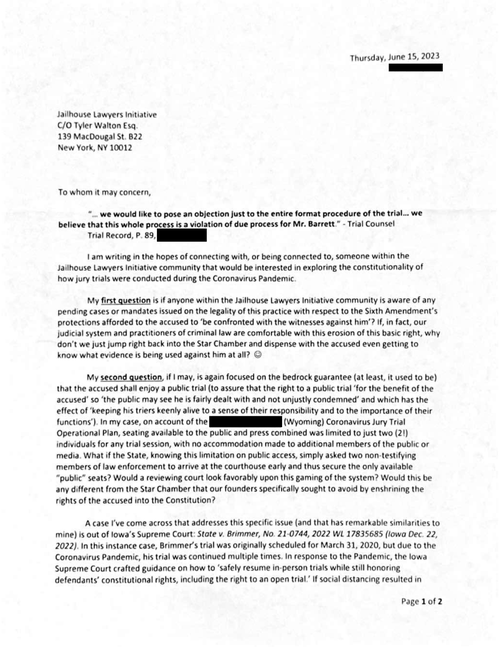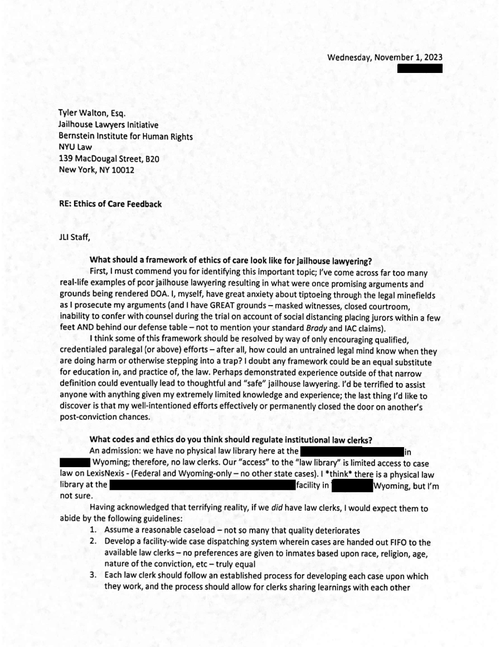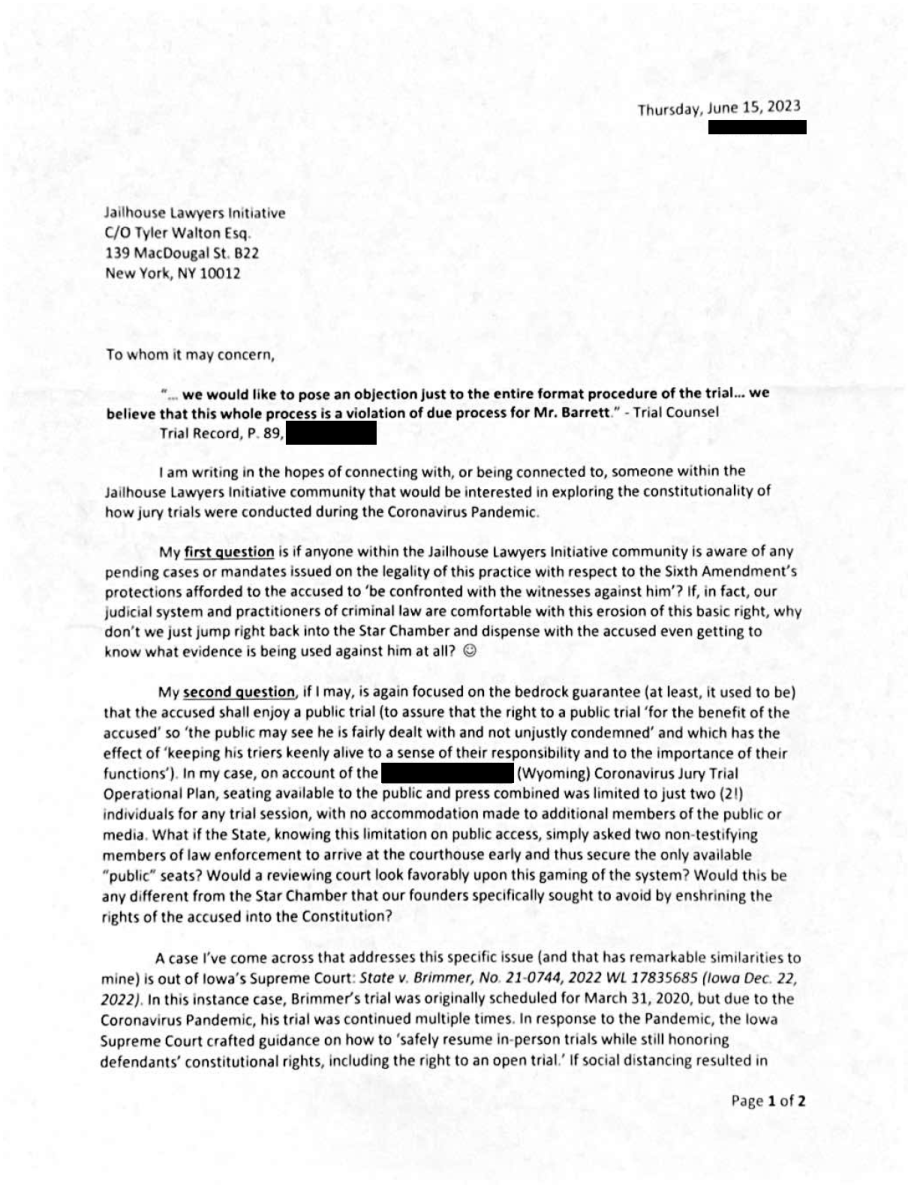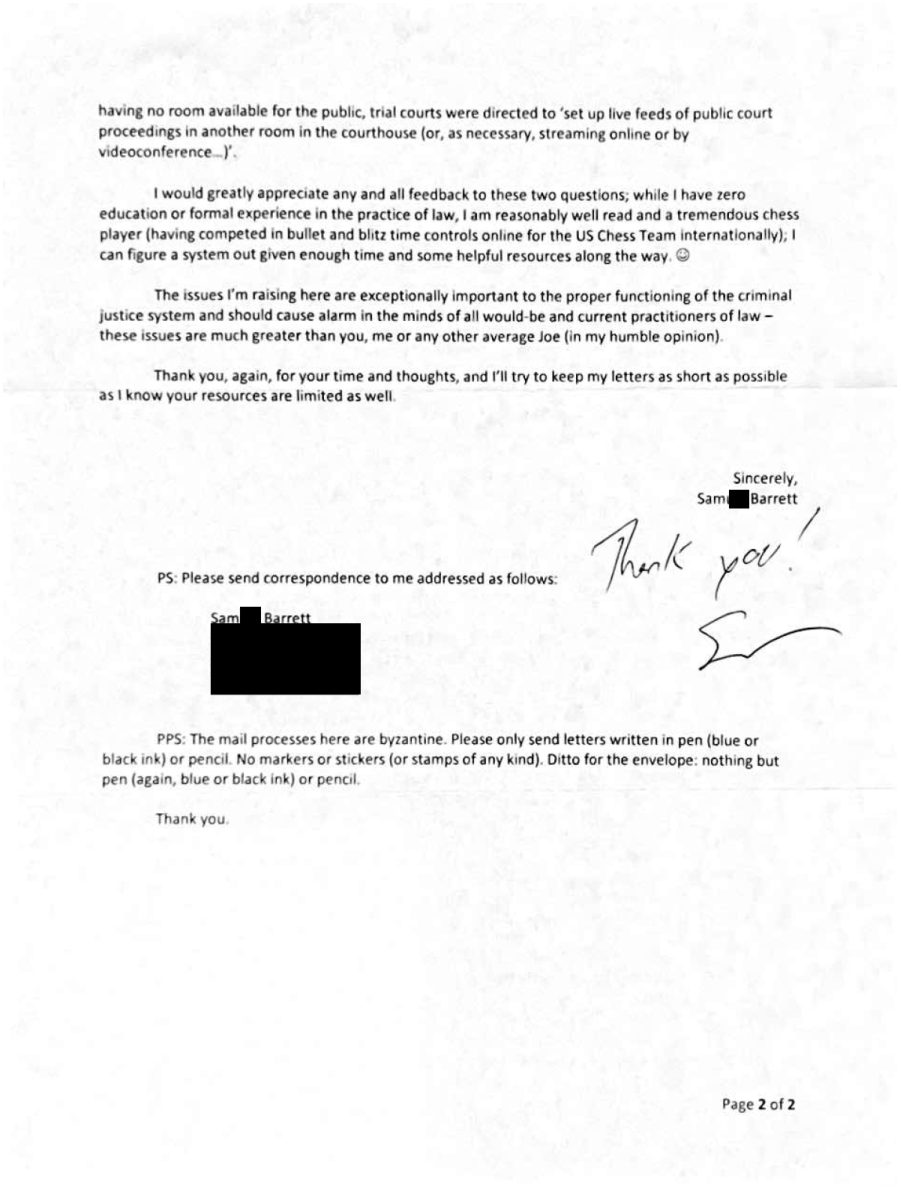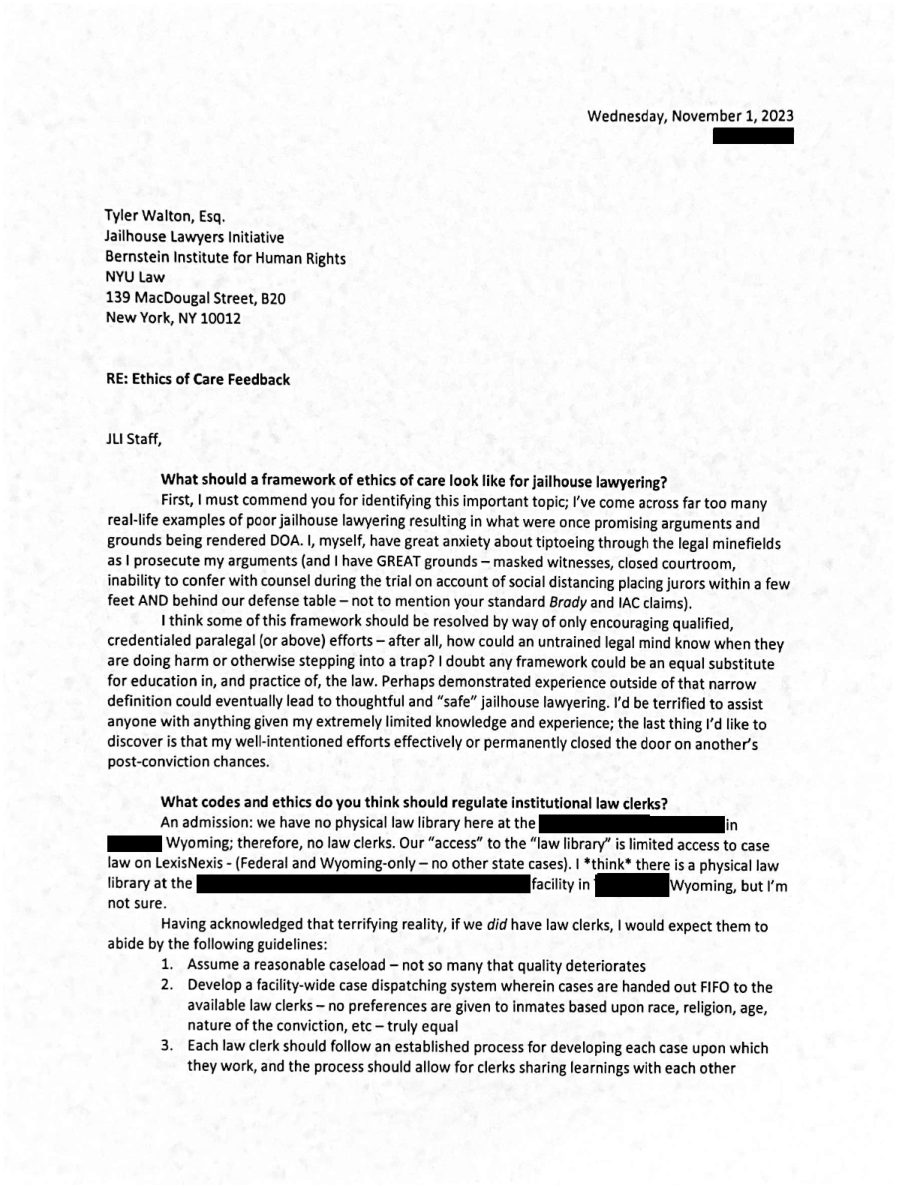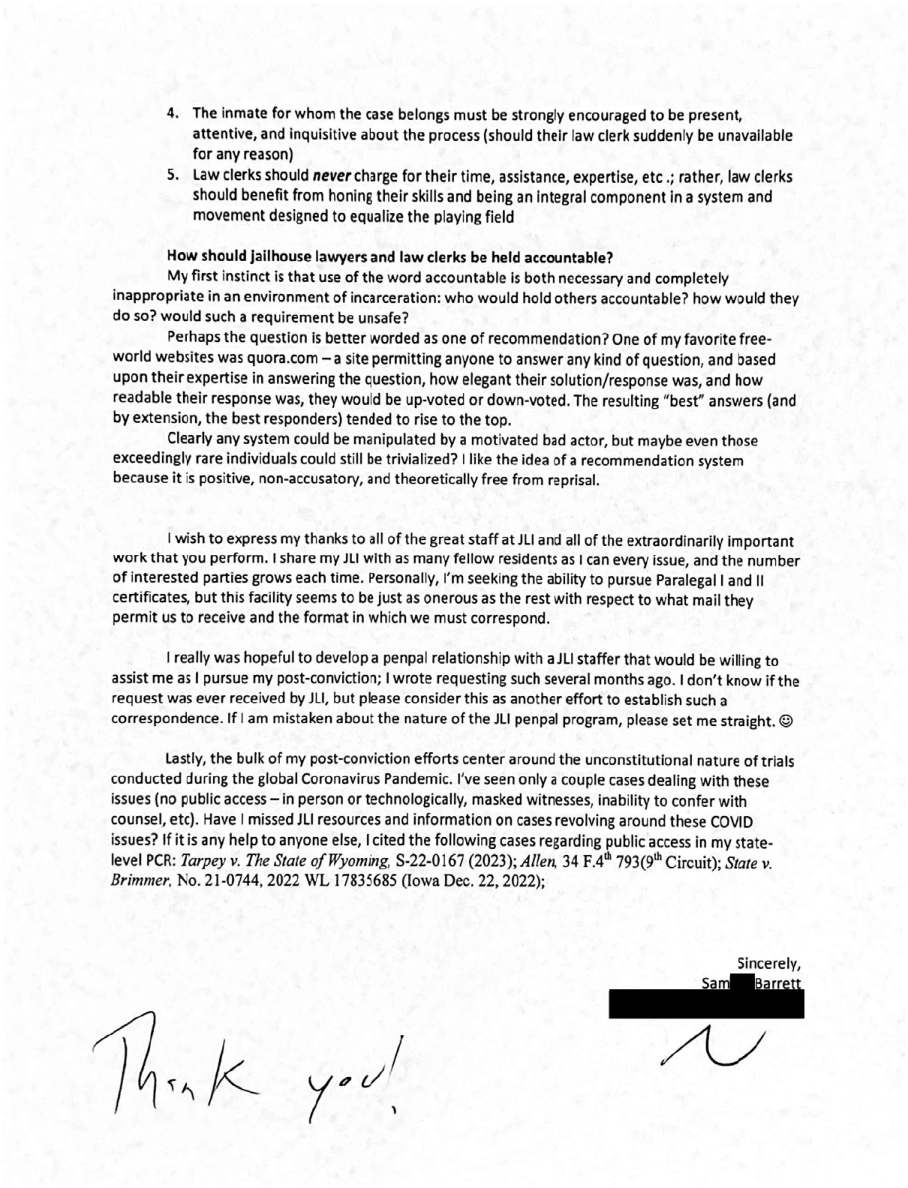Sam Barrett
I wish the world could read this letter so that they could know this:all letters
Sam Barrett
transcription
Thursday, June 15, 2023
[REDACTED]
Jailhouse Lawyers Initiative
C/O Tyler Walton Esq.
139 MacDougal St. B22
New York, NY 10012
To whom it may concern,
" ... we would like to pose an objection Just to the entire format procedure of the trial ... we believe that this whole process is a violation of due process for Mr. Barrett." - Trial Counsel
Trial Record [REDACTED]
I am writing in the hopes of connecting with, or being connected to, someone within the Jailhouse Lawyers Initiative community that would be interested in exploring the constitutionality of how jury trials were conducted during the Coronavirus Pandemic.
My first question is if anyone within the Jailhouse Lawyers Initiative community is aware of any pending cases or mandates issued on the legality of this practice with respect to the Sixth Amendment's protections afforded to the accused to 'be confronted with the witnesses against him'? If, in fact, our judicial system and practitioners of criminal law are comfortable with this erosion of this basic right, why don't we just jump right back into the Star Chamber and dispense with the accused even getting to know what evidence is being used against him at all? (smile)
My second question, if I may, is again focused on the bedrock guarantee (at least, it used to be) that the accused shall enjoy a public trial (to assure that the right to a public trial 'for the benefit of the accused' so 'the public may see he is fairly dealt with and not unjustly condemned' and which has the effect of 'keeping his triers keenly alive to a sense of their responsibility and to the importance of their functions'). In my case, on account of the [REDACTED] (Wyoming) Coronavirus Jury Trial Operational Plan, seating available to the public and press combined was limited to just two (21) individuals for any trial session, with no accommodation made to additional members of the public or media. What if the State, knowing this limitation on public access, simply asked two non-testifying members of law enforcement to arrive at the courthouse early and thus secure the only available "public" seats? Would a reviewing court look favorably upon this gaming of the system? Would this be any different from the Star Chamber that our founders specifically sought to avoid by enshrining the rights of the accused into the Constitution?
A case I've come across that addresses this specific issue (and that has remarkable similarities to mine) is out of lowa's Supreme Court: State v. Brimmer, No. 21-0744, 2022 WL 17835685 (lowa Dec. 22, 2022). In this instance case, Brimmer's trial was originally scheduled for March 31, 2020, but due to the Coronavirus Pandemic, his trial was continued multiple times. In response to the Pandemic, the lowa Supreme Court crafted guidance on how to 'safely resume in-person trials while still honoring defendants' constitutional rights, including the right to an open trial." If social distancing resulted in
Page 1 of 2
having no room available for the public, trial courts were directed to 'set up live feeds of public court proceedings in another room in the courthouse (or, as necessary, streaming online or by videoconference...)'.
I would greatly appreciate any and all feedback to these two questions; while I have zero education or formal experience in the practice of law, I am reasonably well read and a tremendous chess player (having competed in bullet and blitz time controls online for the US Chess Team internationally); I can figure a system out given enough time and some helpful resources along the way. (smile)
The issues I'm raising here are exceptionally important to the proper functioning of the criminal justice system and should cause alarm in the minds of all would-be and current practitioners of law - these issues are much greater than you, me or any other average Joe (in my humble opinion).
Thank you, again, for your time and thoughts, and I'll try to keep my letters as short as possible as I know your resources are limited as well.
Sincerely,
Sam [REDACTED] Barrett
Thank you!
PS: Please send correspondence to me addressed as follows:
Sam
[REDACTED] Barrett
[REDACTED]
PPS: The mail processes here are byzantine. Please only send letters written in pen (blue or black ink) or pencil. No markers or stickers (or stamps of any kind). Ditto for the envelope: nothing but pen (again, blue or black ink) or pencil.
Thank you.
Page 2 of 2
Sam Barrett
transcription
Wednesday, November 1, 2023 Rawlins, WY
Tyler Walton, Esq. Jailhouse Lawyers Initiative Bernstein Institute for Human Rights NYU Law 139 MacDougal Street, B20 New York, NY 10012
RE: Ethics of Care Feedback
JLI Staff,
What should a framework of ethics of care look like for jailhouse lawyering?
First, I must commend you for identifying this important topic; I've come across far too many real-life examples of poor jailhouse lawyering resulting in what were once promising arguments and grounds being rendered DOA. I, myself, have great anxiety about tiptoeing through the legal minefields as I prosecute my arguments (and I have GREAT grounds - masked witnesses, closed courtroom, inability to confer with counsel during the trial on account of social distancing placing jurors within a few feet and behind our defense table - not to mention your standard Brady and IAC claims).
I think some of this framework should be resolved by way of only encouraging qualified, credentialed paralegal (or above) efforts - after all, how could an untrained legal mind know when they are doing harm or otherwise stepping into a trap? I doubt any framework could be an equal substitute for education in, and practice of, the law, perhaps demonstrated experience outside of that narrow definition could eventually lead to thoughtful and "safe" jailhouse lawyering. I'd be terrified to assist anyone with anything given my extremely limited knowledge and experience; the last thing I'd like to discover is that my well-intentioned efforts effectively or permanently closed the door on another's post-conviction chances.
What codes and ethics do you think should regulate institutional law clerks?
An admission: we have no physical law library here at the (Redacted) in (Redacted), Wyoming; therefore, no law clerks. Our "access" to the "law library" is limited access to case law on LexisNexis - (Federal and Wyoming-only - no other state cases). I *think" there is a physical law library at the (Redacted) facility in (Redacted), Wyoming, but I'm not sure.
Having acknowledged that terrifying reality, if we did have law clerks, I would expect them to abide by the following guidelines:
1. Assume a reasonable caseload - not so many that quality deteriorates
2. Develop a facility-wide case dispatching system wherein cases are handed out FIFO to the available law clerks - no preferences are given to inmates based upon race, religion, age, nature of the conviction, etc - truly equal
3. Each law clerk should follow an established process for developing each case upon which they work, and the process should allow for clerks sharing learnings with each other
4. The inmate for whom the case belongs must be strongly encouraged to be present, attentive, and inquisitive about the process (should their law clerk suddenly be unavailable for any reason)
5. Law clerks should never charge for their time, assistance, expertise, etc .; rather, law clerks should benefit from honing their skills and being an integral component in a system and movement designed to equalize the playing field
How should jailhouse lawyers and law clerks be held accountable?
My first instinct is that use of the word accountable is both necessary and completely inappropriate in an environment of incarceration: who would hold others accountable? how would they do so? would such a requirement be unsafe?
Perhaps the question is better worded as one of recommendation? One of my favorite free- world websites was quora.com - a site permitting anyone to answer any kind of question, and based upon their expertise in answering the question, how elegant their solution/response was, and how readable their response was, they would be up-voted or down-voted. The resulting "best" answers (and by extension, the best responders) tended to rise to the top.
Clearly any system could be manipulated by a motivated bad actor, but maybe even those exceedingly rare individuals could still be trivialized? I like the idea of a recommendation system because it is positive, non-accusatory, and theoretically free from reprisal.
I wish to express my thanks to all of the great staff at JLI and all of the extraordinarily important work that you perform. I share my JLI with as many fellow residents as I can every issue, and the number of interested parties grows each time. Personally, I'm seeking the ability to pursue Paralegal I and II certificates, but this facility seems to be just as onerous as the rest with respect to what mail they permit us to receive and the format in which we must correspond.
I really was hopeful to develop a penpal relationship with a JLI staffer that would be willing to assist me as I pursue my post-conviction; I wrote requesting such several months ago. I don't know if the request was ever received by JLI, but please consider this as another effort to establish such a correspondence. If I am mistaken about the nature of the JLI penpal program, please set me straight.
Lastly, the bulk of my post-conviction efforts center around the unconstitutional nature of trials conducted during the global Coronavirus Pandemic. I've seen only a couple cases dealing with these issues (no public access - in person or technologically, masked witnesses, inability to confer with counsel, etc). Have I missed JLI resources and information on cases revolving around these COVID issues? If it is any help to anyone else, I cited the following cases regarding public access in my state- level PCR: Tarpey v. The State of Wyoming, S-22-0167 (2023); Allen, 34 F.4th 793(9th Circuit); State v. Brimmer, No. 21-0744, 2022 WL 17835685 (Iowa Dec. 22, 2022);
Thank you!
Sincerely, Samuel Barrett (Redacted)

